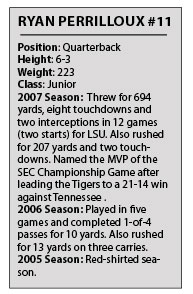Column: Will Perrilloux make the difference?

Our View
Situation:
The university has incoming students go through the Eastern Reads program to read a book over the summer and analyze it.
Stance:
The program is not needed for most students and should only be used for the course EIU 1111-University Foundations.
Reading is one of those fundamental skills that is associated with attending college. Reading, writing and arithmetic are commonly referred to as the essentials of an education and attending college level classes provides students the opportunities to utilize these skills with desired topics.
Eastern Reads is a program in its second year that requires incoming freshmen and transfer students to read a book, then write a response and discuss the book’s ideas in group sessions. The program gives the students a taste of college level academic expectations.
“It’s important for us to set expectations,” said Kimberlie Moock, director of Eastern Reads. “So, we want to show students that it’s an expectation that discussions will occur in the classroom.”
However, students won’t get the message if they don’t participate. There are no consequences for skipping the sessions or not writing the essays. Two of the main keys to success in college involve showing up to class and turning in the assignments.
Such simple skills are taught in high school.
Providing new students with avenues to make friends at a new school are understandable, but that’s what Prowl is for. Transfer Relations also has specialized events to help the students get acquainted with other students in the same position.
In that regard, Eastern Reads is unnecessary. The university doesn’t need to teach or reinforce academic habits into incoming students who already made it through 12 years of school.
Moock said the program is not addressing any academic concerns.
“It’s not a remedial thing in any way,” Moock said. “It’s a way to bring the students together and show them the academic standards.”
However, the Eastern Reads Web site features a link titled, “how to read a book.” There are five steps listed including, “the cover and title page” and “forming an opinion.”
Why wouldn’t that be taught in high school or even elementary school?
According to the Illinois State Board of Education, reading scores from state testing are declining. Robert E. Schiller, State Superintendent of Education, provided a press release in 2003 about test results pertaining to Illinois Standards Achievement Exam (ISAT), given to elementary school students, and the Prairie State Achievement Exam (PSAE), given to high school juniors.
“Overall, these results are not acceptable,” Schiller said. “We need to see accelerated improvement. There just aren’t enough students meeting state standards.”
However, Eastern shouldn’t have to accommodate for a lack of basic public education. Students should have to work harder to get into college, but are the students to blame if the high schools aren’t properly preparing them?
“The results are mixed,” Schiller said. “For the first time, we have five years of results on the ISAT – numbers that can legitimately be described as showing a trend. The trend is encouraging in mathematics and not so encouraging in reading. Overall, though, student performance is flat and we can’t be pleased.”
Moock said programs similar to Eastern Reads are common.
“Reading programs like this are common at many other universities,” Moock said. “We are modeling ourselves after other successful institutions.”
Joe King is an assistant director of Public Affairs at Northern Illinois University and said a similar program exists at NIU. He said the program is on a pilot basis and offered to certain students in UNIV 101, “an intro to NIU” class.
Eastern has a similar class, EIU 1111 – University Foundations. The class is for first year students. According to Eastern’s catalog, the course is “an inquiry into the academic expectations, resources, policies, and traditions of university life.”
King said 13 of the 91 sections of UNIV 101 participate in the reading program and each class contains 20 students. There are also 20 students in EIU 1111, but there are only 32 sections.
One of the improvements to Eastern Reads from last year to this year, according to Moock, is the placement of EIU 1111 professors into discussion circles as a facilitator with their students.
So, why not follow NIU’s example and only require EIU 1111 students to participate in Eastern Reads?
Moock said overall measurement of the program’s effectiveness cannot be measured until the first year participants complete all college levels and graduate in May 2011.
Until then, she said lists of students who participated are being kept and their academic progresses are being monitored from year-to-year. As part of that, EIU 1111 instructors are now able to monitor that process first hand.
While Eastern Reads spends approximately $14,000 to purchase about 2,100 books for the program, not much more expenses are incurred. Moock said more than 87 faculty and staff, and 65 undergraduate students volunteered to assist with the program.
Unless Eastern’s administration believes there is, indeed, a problem with its students’ abilities to read, then Eastern Reads should be limited to use within EIU 1111 courses. The program seems fine in theory, but it only applies to a limited amount of students.
Column: Will Perrilloux make the difference?
Ohio Valley Conference football head coaches and sports information directors picked Jacksonville State to finish first in the OVC this season.

















![[Thumbnail Edition] Senior Foward Macy McGlone, getsw the ball and gets the point during the first half of the game aginst Western Illinois University,, Eastern Illinois University Lost to Western Illinois University Thursday March 6 20205, 78-75 EIU lost making it the end of their season](https://www.dailyeasternnews.com/wp-content/uploads/2025/03/WBB_OVC_03_O-1-e1743361637111-1200x614.jpg)




















































